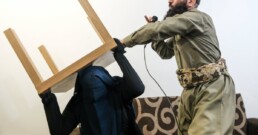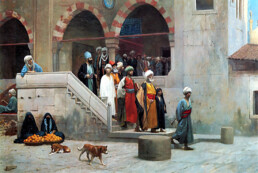Do Jinns possess humans?
This is a brief summary of what I believe to be the most compelling position on Jinn possession. I'd like to believe it has little to do with trying to appease any camp or cohort and simply the product of deliberating on various shar'i sources and scholarly reasonings, all for a significant period of time. All of the following points can be greatly expanded on, as well as many more being added, but for brevity I'll keep to what's here.
In further posts, I'll briefly breakdown some of the points I make here. There are things I believe the shaytan can do to humans (such as touch/المس) but I'll not go into them since I'm specifically concerned in these posts with possession and exorcism.
1. I strongly advocate that Jinns do NOT possess human beings. By possession I specifically mean a spirit entering a body to take control of it, where the soul loses cognitive and physical autonomy to an invading sentient being.
2. These are matters of the ghayb (unseen). So if we aren't informed about something then asserting it is highly questionable. The starting premise (asl) is that it's not the case unless we can evidence, via revelation, that it is.
3. There is nothing in the Qur'an that explicitly mentions possession whilst there are verses that explicitly suggest otherwise and lay it all out:
a) God tells us that "Satan will say, ‘God gave you a true promise. I too made promises but they were false ones: I had no power over you except to call you." (14:22) So the power of the devil is restricted to calling people to iniquity and misguidance.
b) This "call" occurs as whispers/الوسوسة and prompts/النزغ: "...the harm of the slinking whisperer who whispers into the hearts of people, whether they be jinn or people." (114:4-6) The power jinn have in this context is similar to those that humans have; it is whispers and the power of suggestion that God defines as the fitnah of shaytan (7:27), exemplified by the devil's whispers to Adam (20:120) and his wife (7:20).
c) The explicitly prescribed way to overcome this is through seeking refuge with God (الاستعاذة): "If Satan should prompt you to do something, seek refuge with God." (7:200, 41:36) "And say: Lord, I take refuge with You from the goadings of the evil ones." (23:97)
4. Everything else beyond these explicit verses is highly speculative and unconvincing since they seem inconsistent with what is explicit. Anything implicit ought to be understood in light of what is explicit, that's our interpretational framework. The few verses that have been drawn on by past scholars are subjected to far-fetched interpretations and weak reasoning, and the interpretive methods employed by some of them contradicted the principles of exegesis (usul al-tafsir) they advocated - all of which I'll explain later.
5. There is nothing decisively established from the Prophet on this (another reason why jinn possession is so speculative) - the ahadith that scholars draw on have very questionable asanid (chains of narrators) which they legitimise by citing other corroborating but questionable asanid (raising the ahadith to hasan li ghairihi - those scholars who see the problems surmountable in this way). As for the authentic hadith that scholars have cited, they have little to do with possession and mostly concern the 'touch' of the devil and its effects (which I affirm but will explain elsewhere). Just as with the Qur'anic verses, the authentic hadith are subjected to far-fetched interpretations and weak reasoning, especially in light of the decisive verses in the Qur'an.
6. During the prophetic era and closely after, jinn possession doesn't seem to have been a notable social phenomenon nor widely acknowledged or discussed, nor has exorcism for possession been explicitly recorded as either conducted by the Prophet or the companions in his midst. No sahabi is recorded as having been definitively taken over and possessed, nor were the Prophet and his companions recorded as having performed ruqyah for possession (I'll address the hadith of Uthman b. al-Aas later). It's simply absent from the general picture of early Islam and their engagement with the unseen, yet today you'd think we're under mass invasion!
7. People experience events/happenings. Their experiences are real and I don't deny them, but what they make of the event is a matter of perception and interpretation, which is subjective. Two variant witnesses might interpret the same event in very different ways. I believe ruqyah can work for the afflicted, mainly as a source of comfort and as a supplication to God to relieve the person's condition. But ruqyah to drive out an invading spirit that isn't actually there doesn't even make sense.
8. There are many issues with the position (which is why advocates tend to suspend reason on this topic, whilst inconsistently reasoning verses that seem problematic to their position). If reciting some verses (and a sprinkle of holy water/salt) ejects spirits, how is it that the many people purported to be possessed offer salah and attend Jumuah? If it's claimed that the sahabah were possessed, how so when the Prophet was consistently exhorting them with the Qur'an? If 'touch' is possession, was the Prophet Job possessed by the devil (see: 38:41)?! Even if we accept the interpretation of advocates, how is it that an alleged phenomenon so widespread and debilitating was never directly addressed by the Prophet, and no explicit guidance offered? Furthermore, in our context the main challenge to faith is atheism, so why would the devil and his minions possess people only to reveal the unseen to them and prove that religious claims are accurate - it doesn't seem like a solid strategy. And why is it that those who dismiss jinn possession (Muslims and non-Muslims alike) aren't ever possessed and seemingly immune, yet those who take it seriously are the ones under the constant threat of invasion?
9. In this context I believe most raqis are charlatans and fraudsters who've found a way to benefit from the vulnerabilities and desperation of others. I believe some are sincere but ignorant and believe in what they're doing, others acknowledge that they're simply offering comfort to the afflicted and a supplication. Over the years I've personally met all these types who've respectively confided in me.
10. I can't see any benefit to this belief (which is highly speculative to begin with). It does not increase godliness and instead causes people to obsess over supernatural spirits rather than focus on the Most High productively. It tends to promote a superstitious attitude and a preoccupation with the occult and supernatural, grant the jinn powers they don't have whilst confusing the servant as to the cause of his/her tests. Many have seen how it proves a distraction from, and a convenient onus for, a person's shortcomings. Overarchingly, it fosters a culture that demotes reason which then feeds into the general way we do faith. On the flipside, dismissing jinn possession means we seek constructive solutions rather than simply putting problems down to ghosts. It gives less succour to the devil, firstly by further undermining a culture of superstition, and secondly by rendering the devil irrelevant. In this vein the Prophet said: "Don't say: 'May Satan perish!' for if you do he swells up with pride until he is as big as a house and says: 'It is by my might!' Instead say: 'In the name of God' and if you say this he'll shrink until he is as small as a fly.” (Abu Dawud) Think about it, jinn possession offers the devil exactly what he loves, undue focus and attention, and for something the Qur'an tells us he can't even do! Dismissing this idea diminishes the devil as a distraction whilst also placing culpability back in our own laps. Most significantly, it removes a major distraction from our focus on God and subservience to Him where we develop ubudiyyah built on His supreme glory and majesty, and we attribute all power to Him alone in thankful worshipfulness - and not because we're just scared the spirits will get us. In this way, dismissing the idea that jinns possess humans is advantageous to glorifying God and engendering Abrahamic monotheism (hanifiyah) which is ultimately what God wants us to do.
Jinn possessions, exorcists, and all that jazz! Part 1
The Hasanat fiasco on social media has once again brought up, amongst other things, the topic of jinn possessions. I've been overwhelmed by those affected (either directly or indirectly) by this topic to provide some clarity - particularly those who (via my work) have positively changed their attitude towards the Qur'an and have begun to personally engage with God, thus heightening their godly intuitions and critical thinking.
Now an allegedly agnostic raqi has been charging people to perform exorcises he doesn't believe in, taking advantage of the beliefs (and vulnerabilities) of sincere Muslims. Of course, this phenomenon is widespread, but we tend to see it most commonly in matters related to the realm of the paranormal. What I'd like to do is open up these beliefs for critical contemplation. To be clear, I'm not into debating or discussing irrelevant issues or theological views that are of little consequence. (I leave my theoretical shar'i musings for people of shar'i learning, intellect and civility.) And before it's said that I'm merely trying to court controversy let's be real: it's only deemed controversial because some might not like it - not because it's true or false.
The topic of jinn possession is very important. For many ethno-religious communities in the UK, it's had massive social and religious ramifications, nearly all problematic. It's warped theology and focus, uncultivated God-centredness (theocentricity), and entrenched irrationality and superstitious attitudes, many of which often veer towards shirk, all of which lead to regression. I think that regardless of their position on the matter, most would be hard-pressed to argue otherwise. Even many raqis speak out against the prevalent culture and attitude.
Those around me have heard me discuss this topic for years, long before it became an internet 'controversy' - so I'd like to make clear that this is not reactionary. I've only not addressed this sooner because I didn't believe the context was appropriate. For a number of reasons, I believe it is now. This discussion fits into the greater project of godliness (rabbaniyyah), faith (imaan), Abrahamic monotheism (hanifiyyah), reason (aql) and revelation (wah'y). We all want to be proper worshippers of God and truly subservient. These posts are an exploration of how we might be so.
A few important points to note:
- The reality of jinn possession is a matter of ijhtihad. Believing that jinns possess human beings will neither get you into paradise nor keep you out of hell. Theologically, it's not that deep. And no, a position either way doesn't situate you in orthodoxy/heterodoxy. Inherently, it's not an inherent aspect of faith (imaan).
- The discussion is presented in posts, dealing with several key aspects to this topic. I keep it brief and somewhat reductive for social media. It's not a technical presentation (and shouldn't be). Furthermore they're posts and not responses to anyone specifically (lest someone thinks I'm responding to them as the posts progress). I've cut the discussion into pieces so that they're digestible. I'd like people not only to understand what I've written but also to take some time in contemplating the posts from various viewpoints, and I strongly believe that you'll all come to the same conclusions I have. BUT if not, I'm happy to live and let live.
- I'd like to keep things mature and intelligent, and engage in good faith (as always). The discussion here is with me - the arguments are mine. This discussion has been initiated by many people independently. Please leave those discussions with those advocates (whether it's for or against). What they've argued and how they've done so has little to do with me. As Moses said to God, "I have authority over no one except myself..." (Moses included his brother Aaron but that doesn't go for me!). Judge what I'm saying based on the merit of what I say, and to the extent it resonates with your intellect (as Imam al-Shafi'i put it).
- These posts are educational, not polemic. There's a time place for everything, and HERE the purpose will be to explain a position with some clarity so people can gain a clear picture, not debate it - that can be done elsewhere.If people want, they can access the arguments FOR jinn possession elsewhere - obviously there's another position. If you're staunchly against the position explained here, that's cool, do you. But no, you're not the last bastion of truth nor will subservience to God (islam) crumble because people dismiss possession by evil spirits.
May God aid us all to overcome the devil and become the best possible versions of ourselves.
The battle against folk religion and superstition.
Whenever I speak against superstitious beliefs that have crept into the Muslim imagination I’ve found that many are unable to distinguish between theism and superstition, assuming that believing in God and what He has revealed is similar to being superstitious. This is usually predicated on a number of things:
Must we break our fasts with dates - is it ‘better’?
This post is an exploration of the view that we ought to break our fasts with dates. The assumption comes from two main hadith, one is the hadith of Salman b. Amir al-Dabbi: ‘If you break your fast then do so with dates, and if you don’t find any, then with water for it is a purifier for you’ (al-Tirmidhi) which is considered a weak by some hadith scholars. The second is the description of the Prophet, related by Anas b. Malik and reported by Abu Dawud, that the Prophet would consume a few fresh dates or dry dates if he didn't have fresh dates, or water if no dates were present, before offering the Maghrib prayer.
Thinking about the second hadith, the view of Ibn Taymiyyah came to mind:
Similarly, so when he ate dates and bread made from barley (and their like) – all the staple food of his country, does (the notion of) emulating the Prophet mean to specifically intend dates and barley to the extent that it is done by those who neither have dates growing in their lands nor does barley make up their staple diet, but where their staple consists of wheat, rice or other things? It is known that the second is legislated, the evidence of which is that upon the conquest of new regions the Companions would eat the staple of the respective country and wear the clothing of those lands, rather than intentionally seeking the staple foods of Madinah or its clothing. For if the second (i.e. seeking the staple foods of Madinah or its clothing) was better for the Companions they were worthiest of choosing the better.
Majmu’ al Fatawa, Kitab Salah
Some points:
1. It’s important to keep in mind that dates were the staple diet of the Arabs, easily and abundantly accessible, and something they’d eat everyday, all year round (dried for the off-season).
2. If we argue that the hadith establishes an istihbab (shar’i recommendation), is the only thing we take from the hadith the recommendation to break the fast with dates? The hadith ALSO states that the Prophet wouldn’t drink water, doing so only if he didn’t have dates, and that he’d only eat dates before Maghrib prayer. So is the recommendation only to eat dates, or a holistic one that says one ought to break the fast exclusively with dates (and no water) before the Maghrib prayer? If we say no, one may accompany the dates with water (and a whole host of fried fritters), and then pray, is this still ‘the sunnah’? What this speaks to is the way many enact the hadith of Anas b. Malik. They’ll staunchly argue that the hadith informs us that it’s better to break the fast with dates, but rather than follow the hadith through and offer the Maghrib prayer, they’ll follow up the dates with water and other drinks as well as a rich array of fried fritters: samosas, pakoras, falafels etc. If it’s “better” to eat dates because the hadith tells us this, then what for the rest of the hadith? This partial emulation seems inconsistent.
3. Here I’m simply critically exploring the idea that it’s a religiously obliged value to specifically eat dates and whether the Prophet doing so might have been a cultural fact rather than a religious one. The authoritative Hanbali jurist, Mansur al-Bahuti, explained in reference to the hadith of Anas b. Malik that what is analogous to fresh and dry dates is "everything sweet that isn't cooked." (Sharh al-Muntaha)
4. Given that we live in the UK and dates neither make up our staple diets nor are they relatively cheap, the extra effort to purchase dates seems unnecessary. Of course, the idea of buying dates to help Palestinians is a worthy cause, but this specific project of support seems to be one that ought to practiced the entire year - not specifically during Ramadan, and is more a political cause than related to shar’i thoughts around break-fast (iftar).
5. For those who like dates and have them available, I believe there’s value in breaking the fast with them, then praying, and then drinking water etc. However, context will heavily determine what’s optimum. For example, if you’re cutting sugars from your diet then dates may not be the best option, and likewise, if you’ve been lifting heavy in the gym and require a protein boost, then perhaps a protein smoothie is more apt.
6. Given the fact that most of our fruits in London are imports, dates can be accessed like many other fruits, so is it better to opt for dates instead of other fruits? If we argue it is mustahab (recommended) to break the fast with dates then of course yes. But if we see it as a cultural proclivity, I guess it’d be down to a matter of personal preference and looking for something analogous, a natural product that is sweet (fruits, etc).
Fajr thought
A while back someone asked me, "Don't you think it'd be an idea to change the fajr time closer to 7am all year round since that's when our day starts and getting up during summer hours is difficult?
Some thoughts:
- There's a reason the fajr call to prayer includes "Salah is better than sleep".
- As some hadith indicate, some sahabah also found waking for fajr challenging.
- If (and probably when) some research comes out that suggests waking up for a while during summer nights for some meditation is beneficial, the same folk who were complaining yesterday will say: "Look at the wisdoms of the Lawgiver!"
- It's reported that the Prophet wouldn't speak to people after Esha prayer, and would retire quite soon after. So perhaps the problem isn't about getting up early, but when we actually go to bed?
- There is a reason that the fajr Salah is the shortest of the five (two units/rakat), what do you think they are?
"But sometimes I miss fajr"
For those who are God-conscious, this can be an affair that weighs down heavy on the soul (and should do). Some live in absolute despair until it breaks their drive and motivation, and quite paradoxically, they give up altogether! But I would urge that intention is all important. The one who intends to get up and mistakenly oversleeps or presses the snooze button differs from the one who had no intent at all and made no conscious preparation.
A'ishah (related by Abu Dawud) and Abu Darda (related by Ibn Majah) narrate from the Prophet that the one who goes to bed intending to awaken during the night to pray but doesn't because his tiredness overcomes him will be recorded as he intended (i.e. rewarded) and the sleep is considered a sadaqah (charity).
Some scholars put this hadith down to the Esha prayer, some to tahajjud (the optional night prayer), and some to fajr. The Maliki jurist and hadith master, Ibn Abdil Barr, wrote in explanation of this hadith:
مَنْ كَانَتْ عَادَتُهُ الْقِيَامَ إِلَى صَلَاتِهِ الْمَكْتُوبَةِ أَوْ إِلَى نَافِلَتِهِ مِنَ اللَّيْلِ فَغَلَبَتْهُ عينه : فقد جَاءَ عَنْهُ صَلَّى اللَّهُ عَلَيْهِ وَسَلَّمَ أَنَّهُ يُكْتَبُ لَهُ أَجْرُ صَلَاتِهِ ، وَنَوْمُهُ صَدَقَةٌ عَلَيْهِ
Whoever's habit is to perform the obligatory or non-obligatory prayer during the night, and his eyes overcome him, then it comes from the Prophet that a reward for the (missed) prayer is recorded and his sleep is deemed charity (from God)."
al-Istidhkar
This is analogous with the one who mistakenly eats or drinks during Ramadan forgetting that he's fasting, for as the hadith of Abu Hurairah (Bukhari and Muslim) goes, it is God who (charitably) feeds him.
God is merciful and looks out for His sincere servants. As long as you have no intention to offend God or be consciously negligent, why assume God is mercilessly vengeful, or petty?
God is great, supreme in His power and glory, and a benign King of kings. As such, Abu Dharr relates from the Prophet that he said those who offer the fajr prayer are left "in the charge of God", meaning that He personally looks after their affairs, protecting them, for the rest of the day. From my own anecdotal experience, any day that starts with a meaningful fajr prayer, contemplating the words of the Most High and consciously expressing my subservience to Him through bowing and prostrating, sincerely trusting in His plan and divine ability to do all things, ensures that day unfolds a beneficial one.
And of course, if you have been overcome by sleep (or even if you haven't been) and the sun has risen, offer the prayer with a penitent heart to show you care, expecting God to overlook your shortcoming due to His infinite mercy.
Moonsighting: Where are you looking?
Kurayb relates that Umm Fadl sent him to Mu'awiyah in Shaam (the Levant):
I arrived in Shaam and discharged her affairs. Ramadan then dawned upon me whilst I was in Shaam and I saw the new moon myself on Friday night. Later I arrived at Madinah at the end of the month. Abdullah b. Abbas enquired, mentioning the new moon. He then said: 'When did you seen the moon?' I said: 'We saw it on Friday night.' He said: Did YOU see it?' I said: 'Yes and so did the people, they fasted and so too did Mu'awiyah (the caliph).' He said: 'We saw it on Saturday night and we'll continue to fast until we complete thirty (days) or we see the new moon.' I said: 'Does the sighting of Mu'awiyah and his fasting not suffice you?' He said: 'No, for this is what the Messenger of God commanded us to do.'
Muslim
Some interesting points:
- Al Tirmidhi titled a chapter in his Sunan: 'the people of each land/country to determine their own sighting.'
- Those who argue for global sighting do not have a specific narration, but rely on the generality of the prophetic command to fast when you see the moon, where 'you' is said in the plural. So they take the plural to infer all Muslims, rather than a specific community of believers. However, the narration of Kurayb above clarifies how the use of plural pronoun is to be taken.
- Abul Abbas Al Qurtubi inferred from Ibn Abdil Barr that the disagreement over the obligation (as stated by other Imams), or otherwise, of following other places was only if they were close. Ibn Abdil Barr relates a juristic consensus (ijma) that the moon being sighted in one location is not considered where there is significant distance between the two lands, such as between al-Andalus (Spain) and Khurasan (Afghanistan). The modern notion of global sighting was a redundant issue back then simply because of the lack of modern communication and transportation. It would have been untenable. Often, we impose the modern context on the past and miss what they were exactly debating.
- Given the concerns that some have over the processes behind sighting in other countries, bodies have already been setup in the UK to look out for the moon.
- Much of the debate in this country, in the end, tends to boil down to sectarian allegiences rather than a pragmatic resolution to administrative processes.
I believe that the longstanding debate could have (and still can be) easily resolved with a bit of intelligence, pragmatism and maturity. In fact, the whole debacle is indicative of why Muslims are woeful at politics (which is effectively communal decision making).
Are long moustaches haram? The long and short of it
I frequently highlight the prevalence of shar'i ignorance, and that it's usually those who believe they're the vanguards of the shari'ah that cause the most religious problems amongst committed Muslims. Pointing out something is fine depending on how you do it, but unless it's on a qat'i matter, laymen ought to keep their advice to themselves. The culture of misinformed zealotry causes dissonance amongst believers plus it's emotionally taxing; micro-aggressions compound to the extent that it causes Muslims to dislike one another and lead many to doubt the edifice of the shari’ah because it's consequently portrayed as ridiculously petty and dull. One of the purposes of this article is to show how shar’i ignorance, cultural imposition, and fiqh intolerance often turn mundane issues into being perceived as colossal religious ones, when in reality a little common sense goes a long way and tends to put matters into perspective.
Tarawih and "Carnal desires"
Recently, it was brought to my attention that there are men who hold prominent positions in their ethno-religious communities, espousing bizarre views on the tarawih prayer by misusing verses of the Qur'an. They apply the verse: “but there came after them generations who neglected prayer and were driven by their own desires. These will come face to face with their evil, except those who repent, believe, and work actions of righteousness…” (19:59) to those who offer 8 units of prayer in congregational tarawih to then return home whilst others remain to offer 20.
They misuses the words of God the Most High where He clearly did not intend what they claim. Ironically, they claim to champion ‘traditionalism’ yet mischaracterise what God has revealed in the same way as those they rabidly criticise. Whilst I do not personally know of, nor engage, this small cohort or the teacher who espouses this strange application of the verse, blatant misuse of God’s words for banal sectarian purposes is morally wrong and despised by God. “As for those who have divided their religion and broken up into factions, have nothing to do with them. Their case rests with God: in time He will tell them about their deeds.” (6:159)
I hold nothing personal against anyone and seek good will towards all, but very simply, we emphatically know God was not speaking about tarawih, and advocating such a thing, or applying it to tarawih, is deeply wrong. Thus I write this as a clarification and without any desire to engage in futile argumentation - it is particularly for those who have asked me about the (mis)use of the verse.
So to some brief points:
1. I really believed we were past the whole 8 vs 20 rak’at wars. The inanity of the battles that raged in the past decade, particularly between some Salafi and Deobandi groups, had little intelligence to it, absolutely no benefit ever came from it - not by way of godliness nor worship, and anybody who engages in such binary polemics simply exposes their deep ignorance of God's law. To attempt to reignite such pointless argumentation, and especially over optional prayers, evidences a questionable level of maturity (both psychological and religious).
2. “There came after them generations who neglected prayer” refers to disbelieving generations that came after Noah, Abraham and Israel (Jacob), when godlessness prevailed where people disbelieved, abandoning the prescribed prayer and subservience to God, and instead took to evil desires. Verses 41-60 clearly contextualise all of this, and even with all of the polemics of the near-past, I have never heard anyone distastefully resort to applying this verse for such sectarian purposes. It is essentially to apply a verse on disbelievers to worshipful believers!
3. For those who only see validity in what was said by scholars of the medieval period: I have yet to come across a past scholar using this verse in such an overreaching way and applying it to those who offer less or more than 20 rak’at. So unless I’ve missed something substantial from the tradition (which I’m open to), is this a new interpretation?
4. As a scholarly point, I fully affirm the use of epistemic analogies (qiyas ma’nawi) as a variable (qarinah) in determining divine intent, but the gentleman’s incoherent method has taken an ontological point on mandated prayer and applied it to matters related to legal reasoning around optional prayers. It's a fallacious analogy which has resulted in a profoundly erroneous deduction.
5. The message is clearly overdramatised: people do not ‘run off’ after 8 as if committing a crime, nor do they ‘abandon the masjid’ as if it was obligatory to be there in the first place. They simply leave to return home. To assert that doing so is to give in to ‘lustful carnal desires’ is to daftly portray active and sincere worshippers of God, who’ve just stood before God, as leaving the mosque for the whorehouse! (Perhaps he doesn’t know what ‘lustful carnal desires’ means?) Evidently, all of this hyperbolic language is misapplied from the verse which is speaking of something else. Regardless of the legal disagreement, the absence of reason and rationality in the vitriol and the unashamed sectarianism should speak volumes to those who might take such approaches to understanding what God wants as legitimate.
6. There is very little legal understanding in such vitriol. Nights are very short which leaves little space to moderately consume the sustenance the body requires, the rest required to get through 18+ hours of fasting which for many is spent at work, and this doesn't even take into consideration sexual needs. To offer optional prayers despite all of these needs is highly admirable, no matter how many the units.
There are other pertinent points, but for brevity I’ll leave it there.
As a side note: what might be of real benefit to worshippers is to address the way in which 20 rak’at is often performed: unintelligible Qur'anic recitation and hasty movements that resemble little more than bodily jerks. In the quest for numbers that God didn’t stipulate, excellence and heartfelt subservience which God did stipulate are greatly ignored.
May God guide us to what He finds most pleasing and worthy, overlook our shortcomings and weaknesses, and graciously accept the imperfect little acts that we offer.
Note: Please do not waste your day/night posting narrations and arguments about any number of rak’ats for tarawih, God is more impressed if you instead spend that actual time in prayer itself.
Thoughts for the Contemporary Mufti
There are personalities who issue fatwas on politicised matters of faith seeking to position themselves as moderate to non-Muslim liberals, or offer everything as technicalities to present a veneer of intellectualism. Desperate to demonstrate their usefulness, these muftis engage in a one-way competition attempting to outshine others, either by supposing hypothetical problems or framing problems as having a significant impact on society when in reality they only affect a handful of people.










